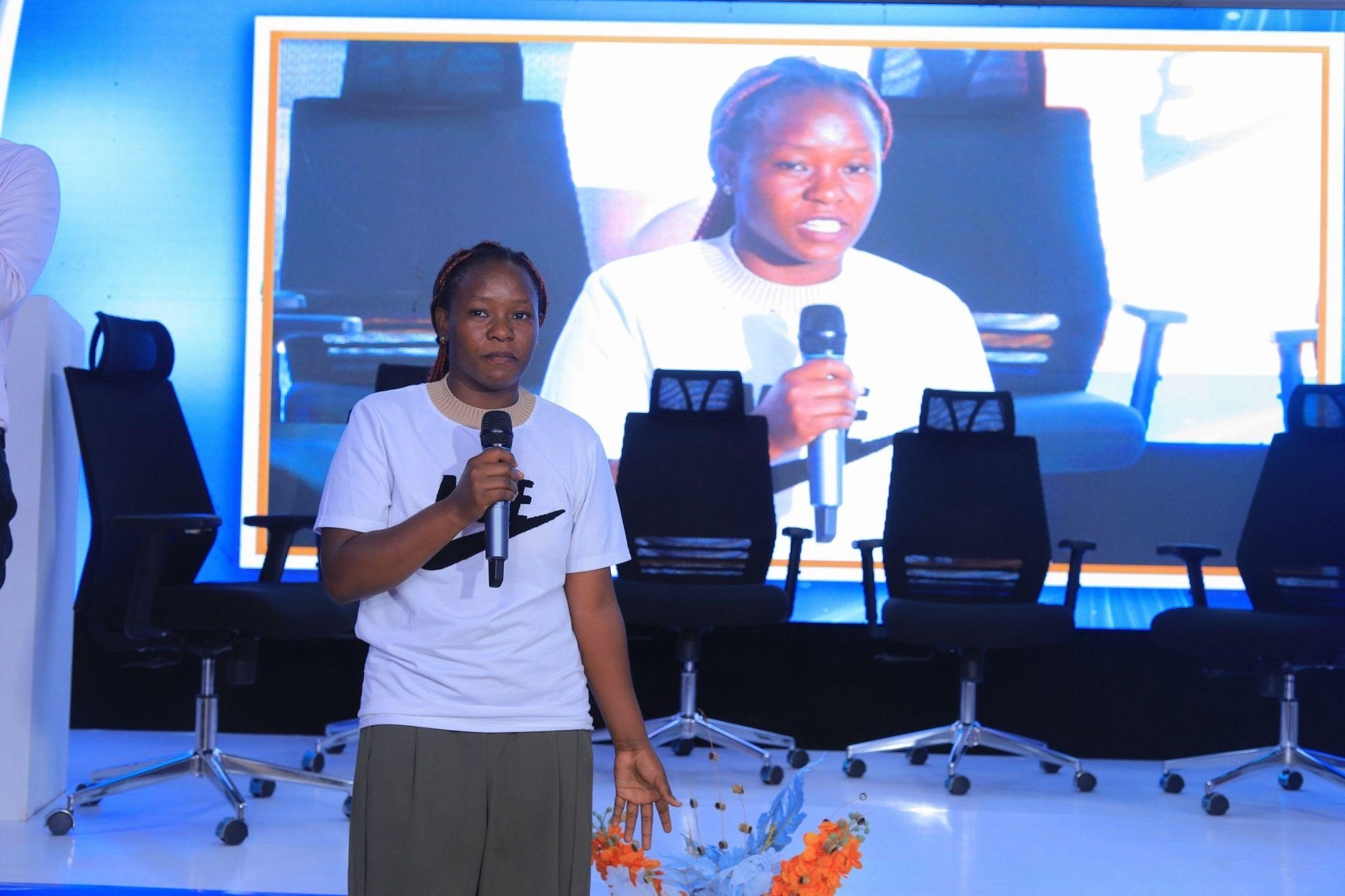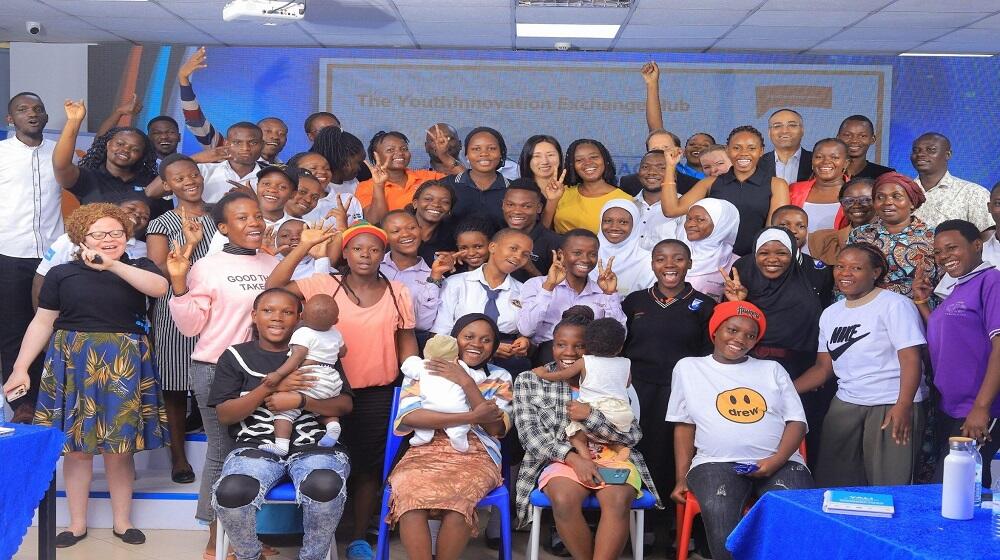As part of the activities to commemorate International Women’s Day on 9 March, UNFPA convened a youth-led dialogue; the Ending Teenage Pregnancy HackLab Dialogue in partnership with the Ministry of Gender and Outbox Uganda, with funding from the Embassy of Sweden.
The event, which took place on 6 March 2024 at OutBox offices in Kampala, brought together in-school and out-of-school youth across Uganda. Among the participants were four key innovator teams: Her Worth Foundation, Bulamu Bridge AI, Diversity Innovations Initiative (DIV) and Ndaba Innovation Hub.
Under the theme “Collaborating to End Teenage Pregnancy in Uganda”, the End Teenage Pregnancy HackLab Dialogue intended to provide a platform for young people to engage in conversations and create solutions on the issues that affect them. It created opportunities for the youth innovators to showcase/present their solutions while soliciting feedback from the audience on the solutions developed by the teams. The event was also intended to raise awareness on the issues surrounding teenage pregnancy in Uganda.
Statistics indicate that in Uganda, one in four (25 percent) girls aged 15-19 years have had a child or are pregnant. According to the Uganda Demographic Health Survey (UDHS, 2022), teenage pregnancy stagnated at 24%, but increased from 19% to 21% in urban areas.
Innovative Solutions in Focus
During the dialogue, the four teams of innovators presented their solutions on teenage pregnancy in their respective communities as described below.
- Ndaba Innovation Hub intends providing sexual and reproductive health and rights (SRHR) information access through comic animated books, creating Ndaba peer clubs in order to hold teenage girls accountable in the Eastern Region districts of Amuria and Kaberamaido.
- Diversity Innovation Initiative presented their Diversity Health App whose purpose is to help young people living with disabilities, especially the deaf, to access SRHR information through sign language, hence enabling them to make better life choices.
- Bulamu Bridge AI, a youth-led initiative, which digitized access to SRHR information and services, thus allowing young people to track their menstruation, interact with a WhatsApp chatbot, and receive referrals to qualified doctors.
- Her Worth Foundation, a young, female-led Community-Based Organization (CBO) based in Gulu, directs effort and energies to ensure that girls and women realize their full potential.
One of the innovators from Her Worth Foundation, Anna Oyat, who is also the co-founder of the organization, noted that there has been a significant change in dropout rates since the inception of the organisation’s mentorship clubs in schools.
“When the organization began in 2021, dropout rates were high, but after implementing mentorship programs, the rates started to decline,” she noted and added that, "The girls never had sanitary pads to use and this lack often led them into relationships where they seek pads from boys and men, resulting in early pregnancies.”
To tackle these challenges, Her Worth Foundation extended their mentorship efforts to schools in Pader, equipping girls with life skills and self-worth, helping them realize their potential while also providing them with reusable sanitary pads.
Nyirarukundo shares her journey: from teenage mother to education advocate.
The teenage mothers present were also given opportunities to discuss how teenage pregnancy has impacted education and relationships with their parents. During their testimonies, the teenage mothers identified key priorities for addressing the high rates of teenage pregnancy and emphasized the importance of raising awareness on how one can continue their education even after becoming pregnant.
In the audience, one young woman had a unique story of resilience and transformation. Nyirarukundo Margaret,19 years old, is among the young mothers who attended the dialogue. She narrated how she conceived her now three-year-old baby at the age of 16.

A resident of Namuwongo-Kasanvu zone, Makindye Division in Kampala, Nyirarukundo was in senior four when she became pregnant. On hearing this news, her father ran away from their home, abandoning her together with her mother, who is living with disabilities.
"My mother was so disappointed," she said, acknowledging how difficult it was for her to process the news. However, her mother later accepted the situation and decided to take care of Nyirarukundo, who revealed that during and after the pregnancy.
"After giving birth, my mother supported me, and I enrolled in a course in Early Childhood Development at YMCA, Wandegeya. I recently completed the program."
Nyirarukundo encourages her fellow girls with unplanned pregnancies to return to school. "They can still return to school and fulfill the dreams they have always had since childhood," she added.
Speaking at the same dialogue, Mr. Daniel Alemu, the UNFPA Deputy Country Representative, emphasized, "If no action is taken to reduce teenage pregnancy in Uganda, then 50 percent of teenage girls are at risk each year. Furthermore, HIV is increasing among adolescent girls and young women, and we need to put our efforts together to reverse this trend with long-term effect on the girl-child and country at large."
In his remarks, Mr. Tomas Lundström, Counsellor Health at the Embassy of Sweden in Uganda, urged stakeholders to advocate for comprehensive sexual education for young girls if teenage pregnancy rates are to be reduced in Uganda, leading to better development.
“Let us advocate for comprehensive sexual education, increase access to reproductive health services, and create supportive environments for young mothers to continue their education,” he said.
The theme of International Women's Day this year is “Invest in women: Accelerate progress”. By co-creating solutions to end teenage pregnancies in Uganda, UNFPA and partners are making the most critical investment for every woman’s future-reducing the vulnerability of adolescent girls to pregnancy.
- Written by Emmanet Nabwire


